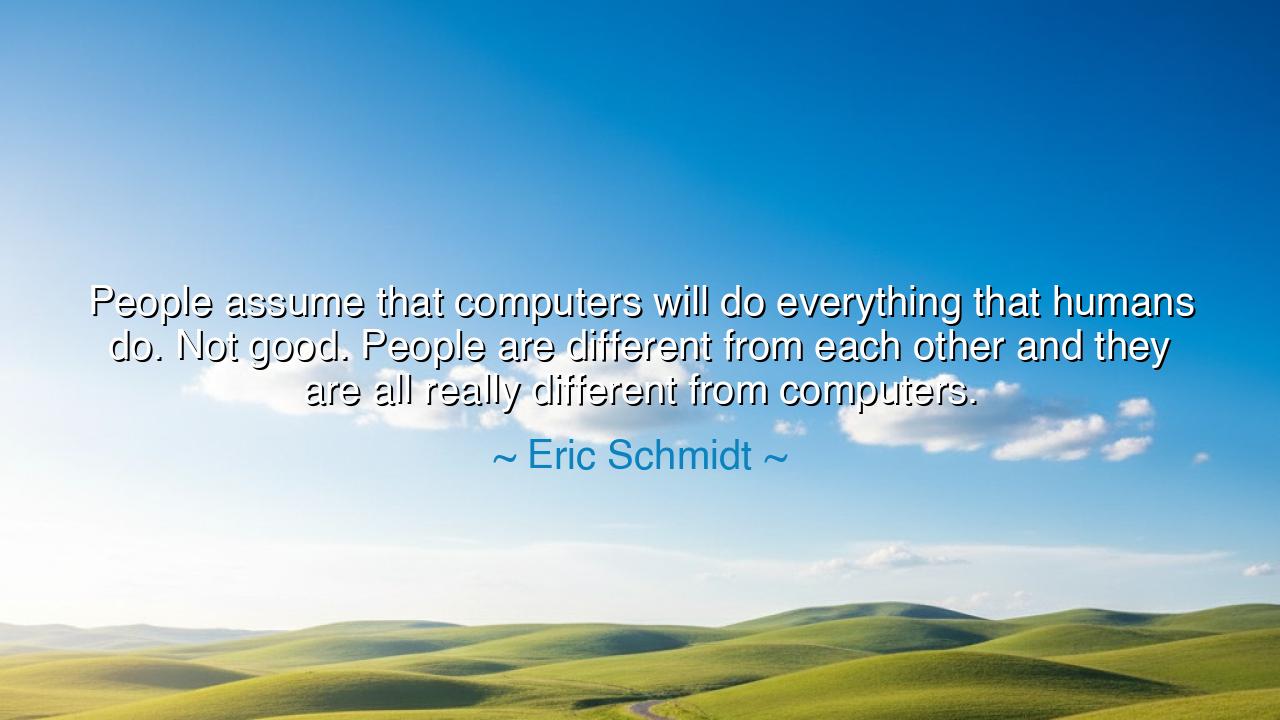
People assume that computers will do everything that humans do.
People assume that computers will do everything that humans do. Not good. People are different from each other and they are all really different from computers.






Eric Schmidt’s words — “People assume that computers will do everything that humans do. Not good. People are different from each other and they are all really different from computers.” — sound like a warning from an oracle at the dawn of the digital age. They remind us that in our quest for progress, we must not forget the sacred essence of what it means to be human. Technology can amplify the mind, but it cannot replace the soul. For within every algorithm lies precision, but not empathy; within every code, logic, but not love.
In this quote, Schmidt — one of the visionaries who helped build the modern Internet through Google — speaks not against computers, but against blind faith in them. He foresaw a time when humanity might kneel before its own creations, mistaking speed for wisdom and automation for understanding. Yet, he insists that humans are not interchangeable with machines. Each person holds a spark of unpredictability, emotion, and imagination — qualities no computer, no matter how advanced, can truly replicate.
History has shown this truth before. During the early days of industrialization, many believed machines would erase the need for human hands and hearts. But art, music, philosophy, and compassion survived — for these belong to the realm of the human spirit, not to silicon. In the 1997 match between Garry Kasparov and IBM’s Deep Blue, the world watched as a computer finally defeated the greatest chess mind of its age. Yet, Kasparov later said, “I could sense the lack of soul.” The machine could win, but it could not dream. It could calculate infinite moves, but it could not feel the thrill of triumph or the sting of loss.
Schmidt’s warning reaches deeper than technology — it touches our identity. As people, we are different from one another, and that diversity fuels our strength. No algorithm can replicate the infinite tapestry of human differences — our laughter, our stubbornness, our longing for meaning. To assume that computers can do “everything humans do” is to erase the sacred unpredictability that gives life its poetry.
Yet, his wisdom also urges balance. The ancients once warned that every tool, if worshipped, becomes a god — and every god, if unexamined, becomes a tyrant. So it is with artificial intelligence. The danger is not in its power, but in our surrender. A computer can process data, but only a human can discern truth. It can simulate emotion, but only a heart can feel compassion. Technology is our mirror, but it must never become our master.
Consider the story of Alan Turing, the father of modern computing. His invention helped save millions during World War II, yet his genius came not from mechanical logic alone, but from his imagination — the human ability to see beyond what exists into what could be. Turing built the machine, yet he knew its limits. He once wrote, “A computer can never be kind, resourceful, beautiful, or brave.” Schmidt’s words echo this same eternal wisdom: machines can aid humanity, but they cannot become humanity.
The lesson here is clear and timeless: use technology, but do not let it use you. Embrace it as a servant, not as a substitute for the human heart. The more advanced our tools become, the more we must nurture our humanity — our creativity, empathy, and moral courage. The danger of the future is not that machines will think like humans, but that humans will begin to think like machines.
Therefore, let every person who hears these words remember: you are not a program. Your worth is not in efficiency but in meaning. You are meant not to compute, but to create. In every age — digital or ancient — it is the warmth of human soul that lights the world. So use your tools wisely, but never forget: it is you, not your machine, who dreams, feels, and loves. That is the difference — and that difference is sacred.






AAdministratorAdministrator
Welcome, honored guests. Please leave a comment, we will respond soon